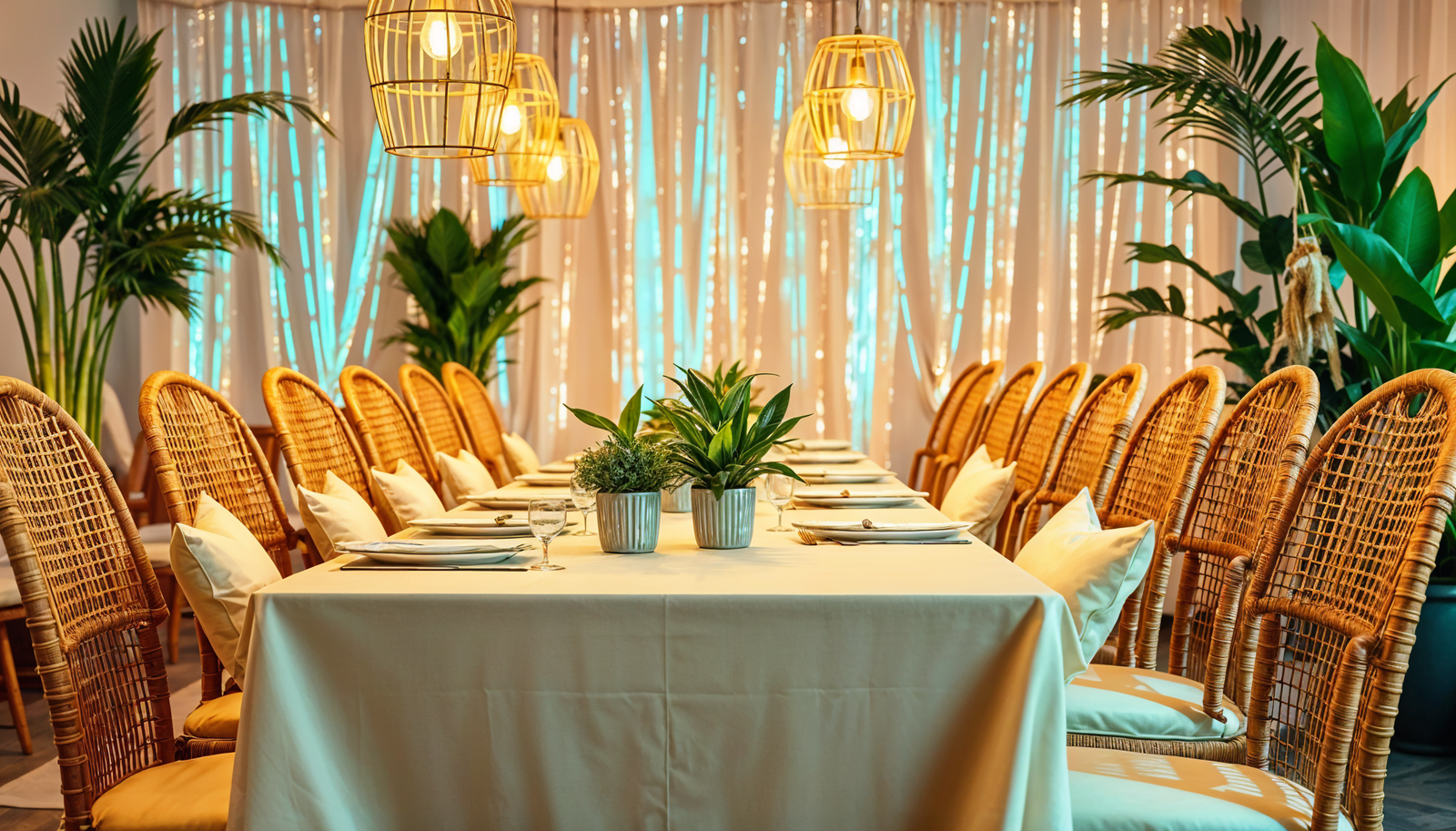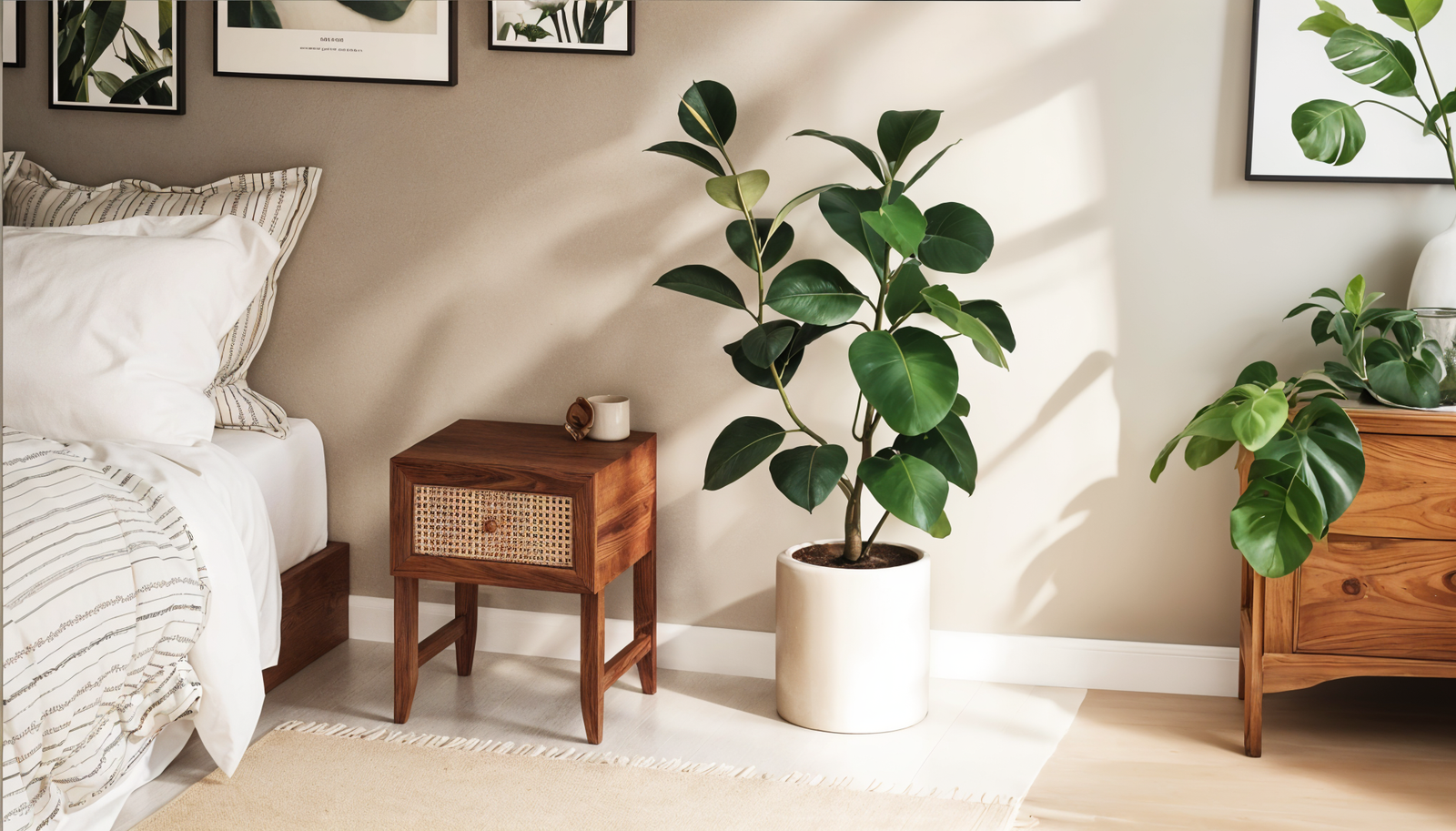🤍 Unmatched Quality, Authentic Craftsmanship
🤍 Unmatched Quality, Authentic Craftsmanship
🤍 Unmatched Quality, Authentic Craftsmanship
Welcome to our guide on Japandi tapestry interior ideas for creating a serene and Zen home ambiance.
If you're looking to infuse your living space with a blend of modern Japandi decor and the cozy comfort of textiles, you've come to the right place.
Japandi style is a harmonious fusion of Japanese and Scandinavian aesthetics, combining minimalist design with warm and inviting textures.
In this article, we'll explore material selection, color palettes, furniture choices, and accessorizing to guide you in incorporating Japandi tapestries into your home decor.
Let's embark on this journey of tranquility and elegance together.
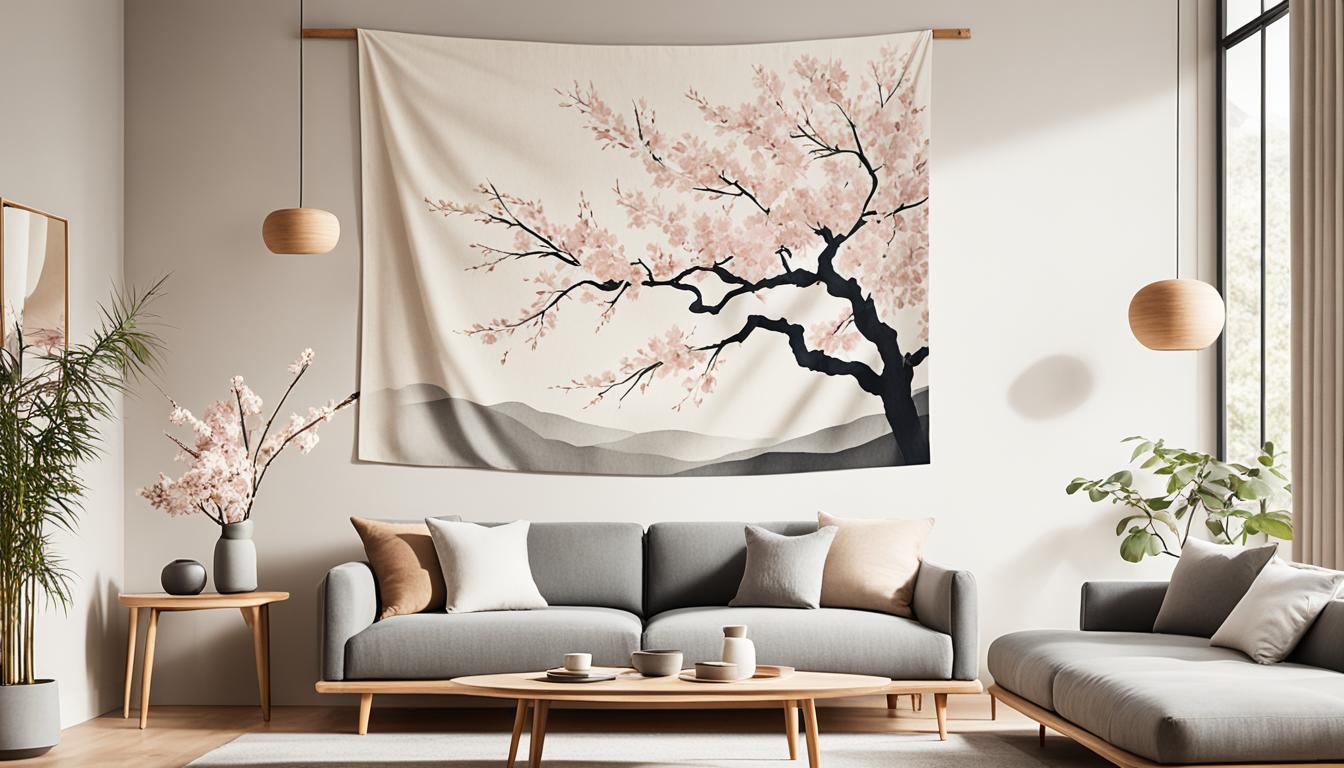
Welcome to the world of Japandi design, where minimalist tapestry designs merge with Zen philosophy to create a harmonious and serene home environment.
In this section, we will explore the essential elements of Japandi aesthetics and how they can be infused into your home decor.
Let's dive in and discover the beauty of Japandi tapestry interior ideas that will inspire a cozy and tranquil living space.
Japandi aesthetics draw inspiration from Japanese and Scandinavian design principles, blending them seamlessly to create a unique and balanced style.
Minimalism takes center stage, with clean lines, simplicity, and a focus on functionality.
Natural materials like wood, bamboo, and stone are incorporated to bring a sense of warmth and natural beauty to the space.
The color palette tends to be neutral, with muted tones and subtle pops of color.
One of the key aspects of Japandi design is its deep-rooted connection to Zen philosophy.
Embracing mindfulness and creating a serene atmosphere are fundamental to this design approach.
Japandi tapestries play a crucial role in infusing Zen philosophy into your home decor.
By incorporating these tapestries, you can create a relaxed and peaceful environment that allows you to unwind and find tranquility amidst the chaos of daily life.
Transform your space into a tranquil oasis with Japandi tapestry interior ideas.
Discover how to incorporate minimalist tapestry designs that speak volumes while creating a serene and harmonious atmosphere.
From neutral color palettes to natural textures and soothing patterns, explore a variety of Japandi tapestry ideas that will bring serenity and tranquility into your home.
When it comes to Japandi tapestry interior ideas, simplicity is key.
Opt for minimalist tapestry designs that promote a sense of calm and balance.
Look for tapestries with clean lines, geometric patterns, and abstract motifs that can enhance the serene atmosphere of your space.
These designs will effortlessly blend with the minimalist aesthetics of Japandi style, creating a harmonious and visually pleasing environment.
One of the key aspects of Japandi design is the blending of Japanese and Scandinavian aesthetics.
To achieve this, incorporate natural and organic textures into your tapestry selection.
Choose tapestries made from natural materials like cotton, linen, or wool, which add warmth and coziness to the overall ambiance.
These tactile textures will enhance the serene and calming atmosphere that Japandi style aims to create.
Another element to consider when incorporating Japandi tapestries into your interior is the color palette.
Opt for neutral tones such as whites, greys, and earthy hues, which will create a sense of tranquility and balance.
These colors can be used as the backdrop for your tapestries, allowing the minimalist designs to take center stage and evoke a serene and peaceful atmosphere in your space.
To complete the Japandi tapestry interior ideas, consider incorporating soothing patterns into your design.
Look for tapestries with delicate motifs or subtle patterns that inspire relaxation and mindfulness.
These patterns can include nature-inspired elements like leaves, branches, or abstract shapes that evoke a sense of serenity and connection to the natural world.
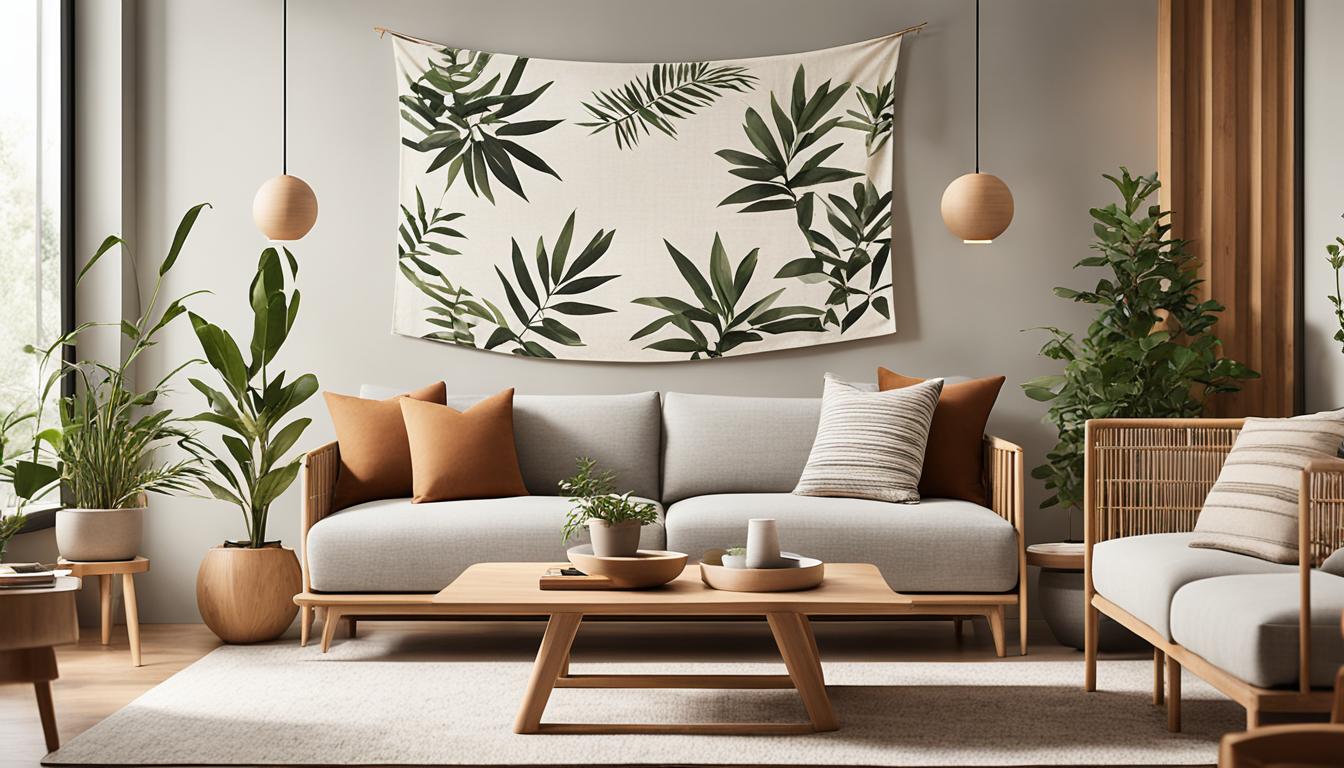
When it comes to creating a cozy and inviting atmosphere in your Japandi-inspired home, material selection plays a crucial role.
Choosing the right fabrics can not only enhance the aesthetic appeal of your tapestry interiors but also align with the principles of sustainability and eco-friendliness.
In this section, we will explore the warmth and beauty of natural fabrics and the importance of eco-friendly materials in Japandi decor.
Natural fabrics, such as cotton, linen, and wool, are known for their comforting and inviting qualities.
These materials have a warm and soft texture that adds depth and coziness to your space.
Cotton, with its breathability and versatility, is perfect for creating lightweight and breathable tapestries that suit any season.
Linen, on the other hand, offers a stylish and luxurious touch with its natural luster and timeless appeal.
Lastly, wool provides excellent insulation and is ideal for colder climates, ensuring a snug and cozy ambiance in your tapestry interiors.
Incorporating eco-friendly materials into your Japandi decor not only helps reduce your carbon footprint but also aligns with the principles of mindful and sustainable living.
Look for tapestries made from organic and sustainably sourced materials, such as organic cotton or linen, that are free from harmful chemicals and pesticides.
These materials are not only better for the environment but also promote a healthier home environment for you and your loved ones.
By choosing eco-friendly tapestry materials, you can create a living space that reflects your commitment to a greener and more sustainable future.
When it comes to Japandi tapestry interior ideas, color palettes play a crucial role in setting the mood and creating a serene atmosphere in your home.
By carefully selecting shades that evoke tranquility, you can enhance the overall Zen-inspired ambiance of your living spaces.
One of the key aspects of Japandi color schemes is the combination of neutral tones with subtle pops of color.
This creates a sense of serenity and balance, allowing the natural beauty of the tapestries to shine through.
Consider using muted shades of beige, gray, or cream as a base, and then introduce soft hues of blue, green, or blush for a touch of tranquility.
To truly harmonize colors with natural elements in your tapestry decor, draw inspiration from the surrounding environment. Incorporate earthy tones like moss green, terracotta, or sandy beige to mimic the colors found in nature.
This creates a cohesive and visually pleasing aesthetic that brings the outdoors inside, promoting a sense of peace and connection.
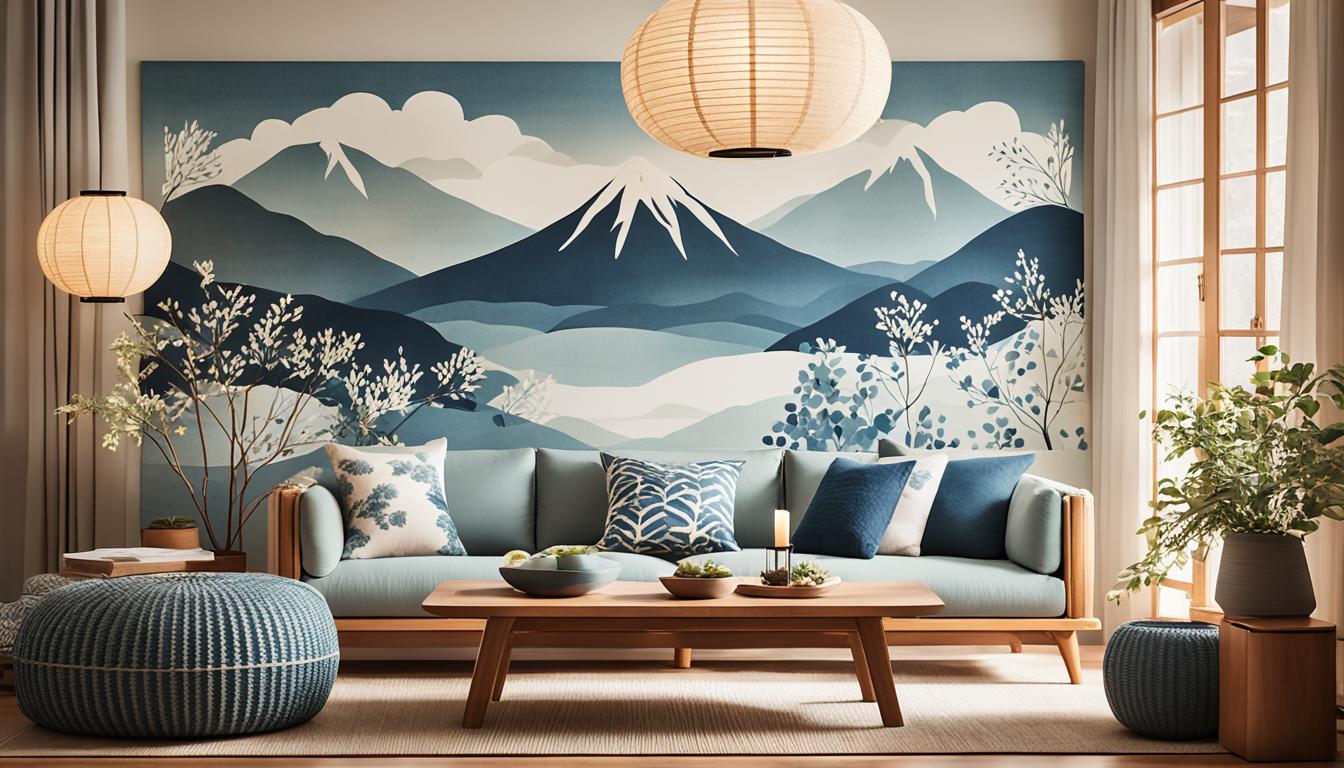
By selecting the right color palettes and harmonizing them with natural elements, you can create a soothing and serene atmosphere in your home with Japandi tapestry interior ideas.
Let the colors guide you on a journey to tranquility and create a space where you can truly unwind and find peace.
When it comes to Japandi-inspired home decor, minimalist tapestry designs are the perfect way to make a statement.
These designs embody simplicity, elegance, and a sense of calm that can transform your living spaces into serene retreats.
Minimalist tapestries feature clean lines, geometric patterns, and abstract designs that speak volumes without overwhelming the space.
They effortlessly blend with Japanese and Scandinavian aesthetics, creating a harmonious fusion of simplicity and beauty.
Embracing minimalist tapestry designs allows you to create a sense of serenity and balance in your Japandi-inspired interior.
By incorporating these statement pieces, you can add depth and visual interest to your walls while maintaining a minimalist aesthetic.
Explore the beauty and power of minimalist tapestry designs that speak volumes in your Japandi-inspired home decor.
Let these pieces evoke a sense of tranquility and create a serene atmosphere in every room.
| Tapestry Design | Description |
|---|---|
| 1. Geometric Abstraction | Bold geometric shapes and patterns in neutral tones, creating a modern and sophisticated look. |
| 2. Monochrome Minimalism | Absence of color with simple, minimalist designs that emphasize texture and form. |
| 3. Nature-inspired Simplicity | Subtle motifs inspired by nature, such as branches or leaves, that bring a touch of organic beauty to the space. |
| 4. Clean Lines and Symmetry | Perfectly balanced designs with precise lines and symmetry, creating a sense of order and calm. |
| 5. Abstract Serenity | Flowing abstract patterns that evoke a sense of serenity and tranquility, allowing the mind to wander and relax. |
When it comes to creating a Zen-inspired home design, Japandi wall art plays a crucial role in setting the tone and aesthetic of your space.
Transforming blank walls into captivating focal points, Japandi wall art adds depth, visual interest, and cultural significance to your tapestry interior.
By carefully selecting pieces that complement the Japandi aesthetic, you can create a harmonious and balanced atmosphere that radiates tranquility and elegance.
Choosing the right Japandi wall art involves finding pieces that align with the minimalist sensibilities and natural elements of the Japandi design philosophy.
Opt for artwork that incorporates clean lines, simple forms, and subtle textures to maintain the understated elegance that defines the Japandi style.
Consider artworks with organic motifs, such as floral or nature-inspired designs, to evoke a sense of serenity and connection with the natural world.
Additionally, pay attention to the color palette of the wall art.
Opt for neutral tones, such as muted grays, soothing blues, or warm earthy hues, to create a cohesive and calming ambiance within your space.
These colors complement the Japandi aesthetic, allowing the wall art to seamlessly integrate with the overall design scheme of your room.
One of the distinct elements of Japandi design is the incorporation of Japanese influences.
To enhance the Japandi aesthetic in your modern interior, consider incorporating traditional Japanese wall decor into your space.
This can include elements such as Japanese paintings, prints, or calligraphy.
Japanese art possesses a rich cultural heritage and adds a sense of depth and authenticity to your tapestry interior.
Explore artwork that captures the essence of Japanese aesthetics, such as the delicate brush strokes of traditional Japanese ink paintings or the intricate details of woodblock prints.
The combination of these art forms with the simplicity of the Japandi style creates a unique blend of modernity and tradition, adding layers of complexity and cultural richness to your wall decor.
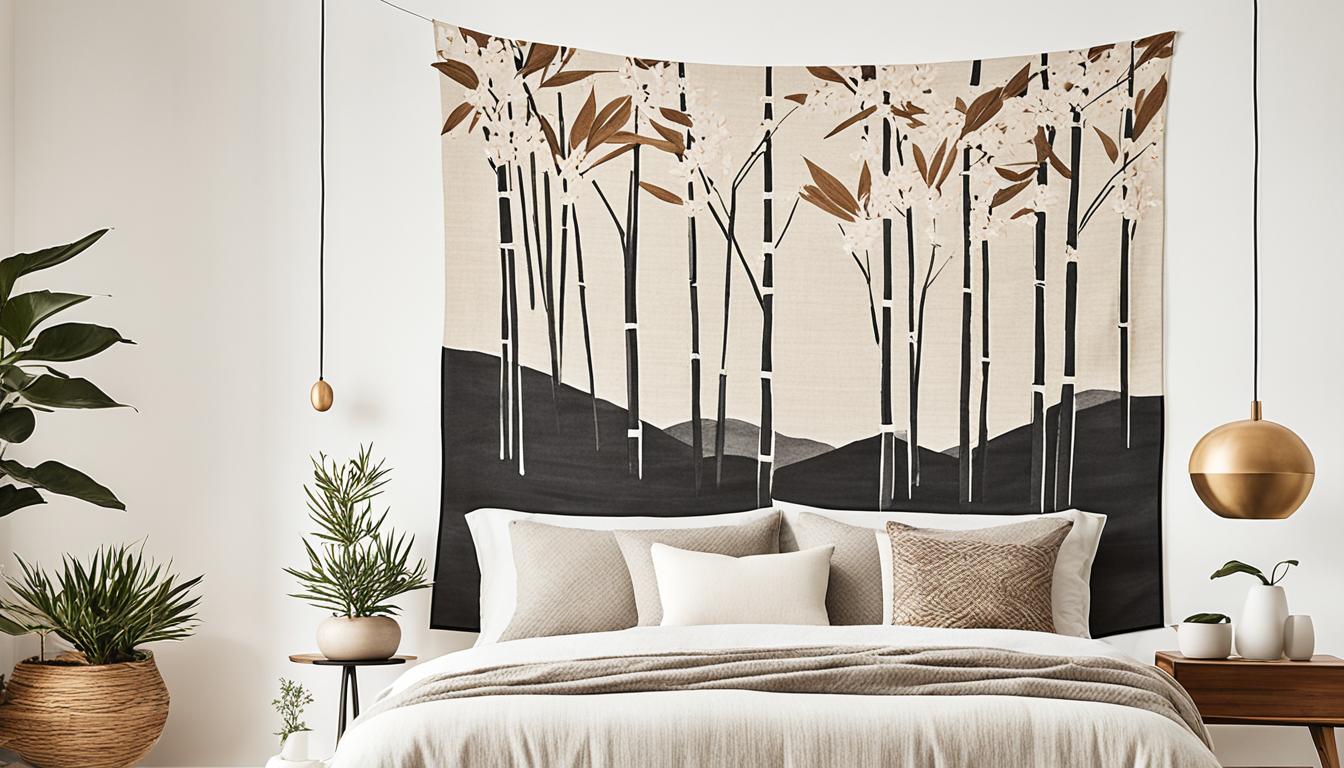
Create a cohesive Japandi look in your home by carefully selecting furniture that matches your tapestries.
When designing your Japandi-inspired interior, it's important to pick furniture pieces that complement the colors, textures, and styles of your tapestries.
This will help create a harmonious and balanced aesthetic.
When selecting furniture for your Japandi-inspired home, consider the following:
By selecting furniture that matches your tapestries, you can create a cohesive and visually appealing Japandi look in your home.
One of the key aspects of Japandi design is the use of textiles to add warmth and coziness to a space.
To achieve the perfect blend of Japandi style with textiles, consider the following:
By blending Japandi style with textiles, you can create a harmonious and inviting atmosphere in your living spaces, combining the best elements of Japanese and Scandinavian design.
Add the finishing touches to your Zen home with Japandi tapestry accessories that reflect the ideals of simplicity, balance, and comfort.
These small yet impactful details can elevate your space and create a harmonious ambiance.
When accessorizing your Japandi interior, consider pieces that echo the minimalistic and natural aesthetic of the style.
When selecting accessories for your Japandi-inspired home, opt for pieces that align with the principles of balance and simplicity.
Look for items that feature clean lines, natural materials, and subtle textures.
Vases made of ceramics or pottery can add an earthy touch, while sculptures crafted from wood or stone can bring a sense of grounding to your space.
To enhance the peaceful and Zen atmosphere, consider incorporating decorative items that embody the tranquility of nature.
This could include small potted plants, bonsai trees, or botanical prints.
By bringing elements of the outdoors inside, you can create a soothing environment that promotes relaxation and mindfulness.
Cozy Japandi tapestry touches can add warmth and comfort to your living spaces.
Consider including soft textiles like cushions, blankets, or woven rugs that feature subtle patterns or natural colors.
These details can provide a sense of coziness and tranquility, inviting you to relax and unwind in your Japandi-inspired home.
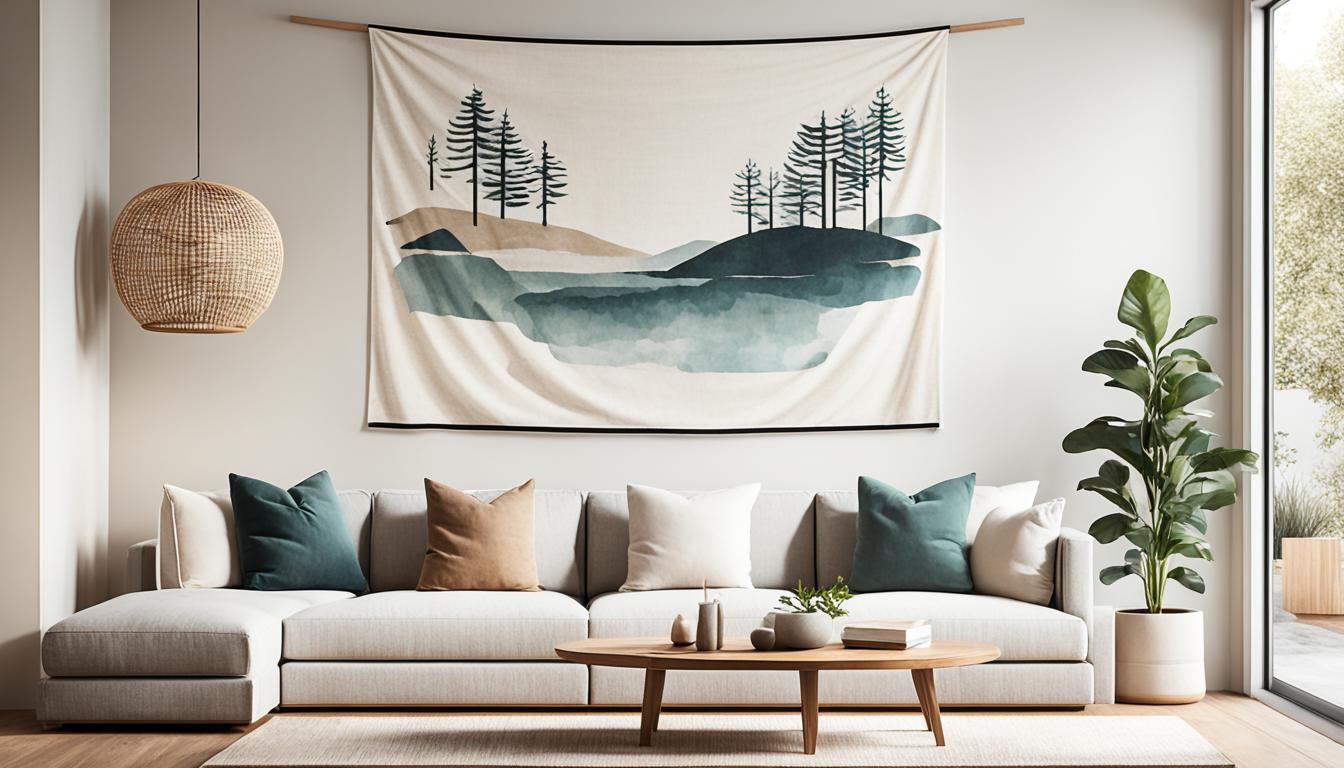
Embrace the concept of Hygge, a Danish term that celebrates comfort and coziness, by incorporating soft lighting and candles.
These small yet significant additions can further enhance the serene and inviting atmosphere of your Japandi tapestry interior.
Remember, the key to accessorizing your Japandi-inspired home is to choose items that contribute to an overall sense of balance, simplicity, and comfort.
By thoughtfully selecting each piece, you can create a Zen sanctuary that truly reflects your personal style and fosters a peaceful mindset.
When it comes to incorporating Japandi tapestries into your home, it's essential to consider functionality along with aesthetics.
Japandi tapestry interior ideas can transform any space into a functional and serene oasis by utilizing textiles strategically.
In this section, we'll explore Japandi design tips specifically tailored to multipurpose rooms, allowing you to maximize space while maintaining the core principles of Japandi philosophy: minimalism, simplicity, and balance.
In multipurpose rooms, such as living rooms or home offices, it's crucial to create distinct zones that serve different purposes while maintaining a cohesive aesthetic.
When incorporating Japandi tapestries, consider the following design tips:
Now that you have read the above article, maybe you still have a couple of questions on this topic, so we will answer these questions below.
Japandi design is a merging of Japanese and Scandinavian aesthetics, combining the minimalism and serenity of Japanese design with the simplicity and functionality of Scandinavian design.
You can incorporate Japandi tapestries into your home decor by selecting minimalist tapestry designs that create a serene and harmonious atmosphere.
Choose neutral color palettes, natural fabrics, and soothing patterns to create a tranquil oasis.
Japandi color schemes combine neutral tones with subtle pops of color to evoke a sense of serenity and balance.
Harmonize colors with natural elements in your tapestry decor to create a cohesive and visually pleasing aesthetic.
Minimalist tapestry designs are characterized by clean lines, geometric patterns, and abstract designs.
These designs create a sense of serenity and calm in your living spaces, making them the perfect statement pieces for a Japandi-inspired interior.
When it comes to finding Japandi tapestry inspiration, one place to start is Mojo Boutique.
This online store specializes in offering a curated collection of home accessories inspired by different design styles, including Japandi.
From wall hangings with natural motifs and soothing colors to tapestries adorned with geometric patterns, Mojo Boutique has a range of options that align with the Japandi aesthetic.
As we conclude our exploration of Japandi tapestry interior ideas, we reflect on the transformative power that this design aesthetic can bring to our homes.
By embracing the principles of mindfulness, simplicity, and natural beauty, we can create well-balanced and harmonious living spaces that invite peace and harmony into our lives.
Through the careful selection of minimalist tapestry designs, the use of natural and eco-friendly materials, and the harmonization of color palettes with natural elements, we can create a sanctuary for relaxation, contemplation, and joy.
The combination of Japanese and Scandinavian aesthetics in Japandi-inspired decor offers us a unique opportunity to merge minimalist design with cozy textiles, creating a tranquil ambiance in our homes.
So let us embark on this Japandi journey and invite the serenity of tapestries into our lives.
By infusing Zen philosophy into our home decor and embracing the principles of Japandi design, we can establish a well-balanced and peaceful environment that nurtures and rejuvenates our spirits.
Let us create Japandi-inspired living spaces that truly reflect our individuality, while bringing a sense of unity and tranquility to our everyday lives.
